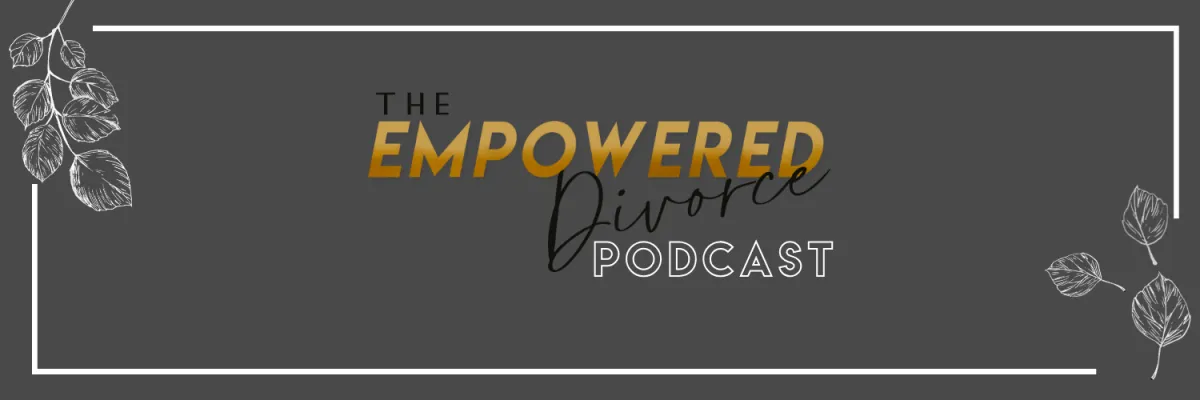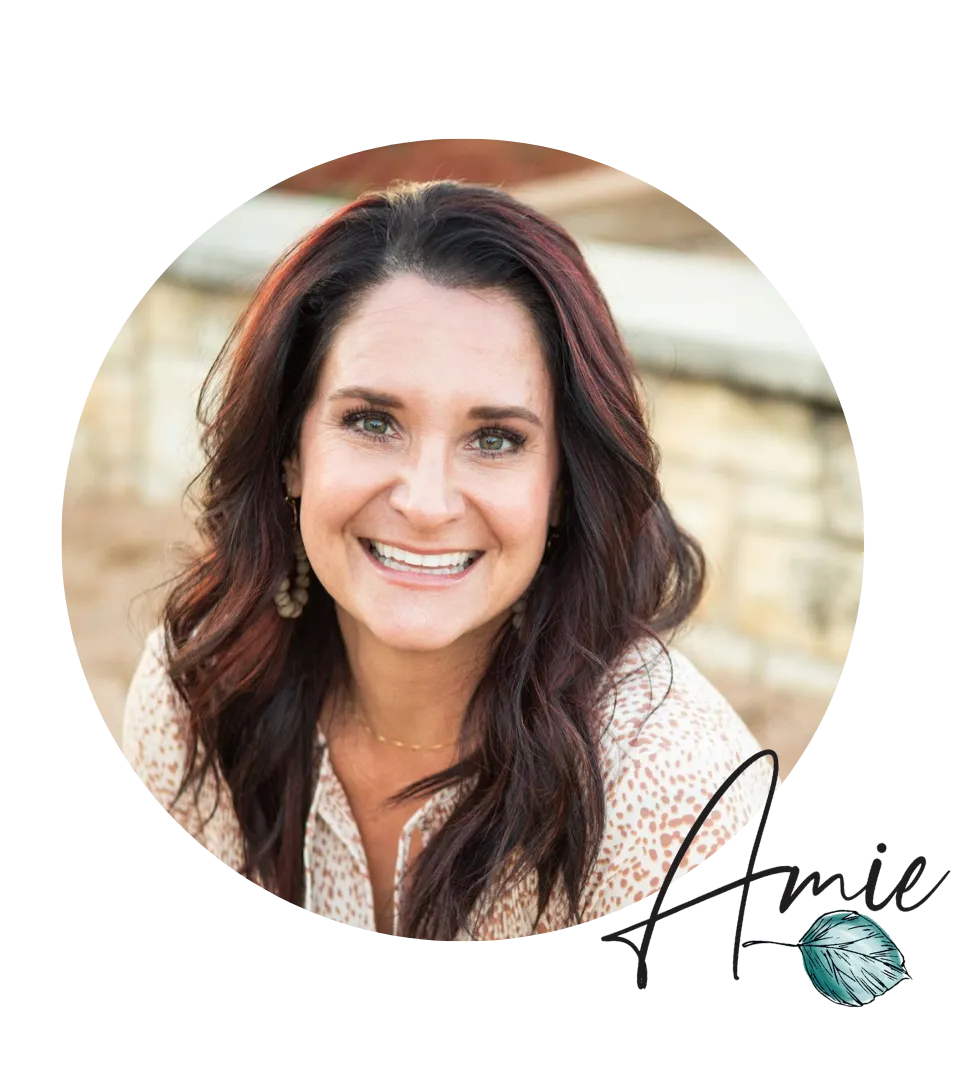
138. Why It's Not a "Normal" Divorce: It's A life Saving Divorce
In this empowering episode, I dive deep into the profound differences between a typical divorce and a life-saving divorce. If you’ve ever felt guilt, confusion, or shame because your divorce doesn’t look like the amicable, co-parenting stories on social media, this episode is for you.
I explore why leaving an abusive, toxic, or harmful relationship is not a failure but an act of courage and self-preservation. Discover why the grief, healing process, and rebuilding after a life-saving divorce are so unique—and why it's okay if your journey doesn’t look like anyone else’s.
Learn how to anchor into your truth, reclaim your autonomy, and move forward despite societal expectations and the relentless pressure to “make it work.”
Read Full Transcript
Hello. Hello, my amazing, beautiful listeners. How are you today? I wanted to do a quick. Episode I say quick. You never know how long I'm gonna talk. I'll be honest, I sometimes I get on here and I'm like, oh, I'm just gonna answer this question really quick. Or, oh, you know what? I have a few thoughts about this topic and my chatty brain just keeps going.
I did want to jump on and address. Something today. I know I've mentioned it before in other podcasts. Episodes, but I don't necessarily know if I've done an entire episode around this. If I have whatever, never hurts to repeat something. But I saw a social media post which is why I'm coming on here.
I was like, you know what, I'm gonna talk about this. I saw a social media post the other day where someone's father was helping his ex-wife set up for her second marriage. And the daughter who filmed this was just stating how grateful she was that the love of her parents still showed that they still showed each other love and support and that they can keep doing this despite divorce and.
After all of these years, my heart will still do flip flops on posts like this because on one hand it's awesome that the result of a divorce for a woman did not taint her view of love, and I'm talking about the daughter, right? The daughter who had two parents that got divorced. It, it didn't taint her idea of love and hope.
Because of how she's watching her two parents support each other and continue to show love towards each other as well. Again, from just what I'm gathering from her words and her post on social media, obviously you never know exactly what's going on. Let's just be real about that too. it's this impression, right?
I'm scrolling around, scrolling through this and I see it, the first thing I think about is y'all. I think about all of my clients. I think about me years ago when I too was wondering what is wrong with me that I don't have a divorce like that? What is, what am I doing wrong?
then if I'm being even more honest, there were also parts of me and times where. I never wanted to see that face again in my entire life. I would be happy if I never had to look at that face again. So this idea of two people like co-parenting, right? I did an episode on the difference between co-parenting and parallel parenting, like all of these normal divorces and even the things that people will say around divorce That insinuate, we should still be getting along that. why can't we make it work for the kids? I remember my ex even getting so mad and upset and using this narrative against me, like, why, what is wrong with me that I'm not? Inviting him into my house or crying out loud, or sharing birthday parties or just, sitting next to him at the game and shooting the breeze.
Well, there's a dang good reason. You're my abuser. So no, I'm not going to, and doesn't matter because if I do start to let my guard down and give an in, she take a mile. Or if I do share something vulnerable, then you end up using it against me, weaponizing it. So like, no. Right. Yet people around me oftentimes would judge or would even shame why I wasn't able to be like these people on this social media post.
Right. So I, I just wanted to come on here and do a quick episode to validate that there is a difference between a normal divorce and a life saving divorce. it can really be nuanced because there's so many of you that say you are wanting amicability.
You don't want contention yet. You're dealing with someone who is emotionally immature where the level of of maturity that is required in a amicable relationship is not going to be available to you. But I see many of you are stuck. In this invisible war that no one else even really sees and societal expectations around, the healthy co-parenting, being able to stay friends on behalf of the children.
It just creates a deeper confusion, creates guilt and suffering. I was gonna say pain, but I, I think there's, there's suffering here. We're fighting against reality and when we fight against reality, we suffer. So above all, I just wanna say I see you and I hope that you can feel, hope and empowerment actually after today's episode.
Because choosing to leave a relationship that hurts you is not giving up. It is choosing to protect your soul. It is choosing to reclaim your peace. Fight for your life. When you are in a relationship and you are not able to live in integrity or live in alignment with your core values, then slowly but surely you will lose your freedom to live, which is why I call it a lifesaving divorce.
Lifesaving divorce is not about ending love. It's about ending harm. This is why a lot of times we still feel a sense of love. It's why we can still be deeply hurt when the other partner moves on so quickly. when there's still that reality fragmentation and we're not quite sure what happened and we're trying to wonder if it was good.
Was it all bad? there's love because you showed up in love. It's not a failure because it ended, it's. It's a courageous act of self preservation at this point, so your divorce is not like theirs and it's okay. One of the hardest traps that I see people falling into is comparing their divorce to others, especially those little neat and tidy Instagram stories of divorced couples, still celebrating holidays together for the kids as well.
Those examples are often involving a mutual respect that both have for each other still. It involves accountability. It involves safety, not just physical safety, emotional, mental, spiritual, which those things are missing in betrayal or abusive divorces. Your reality is different because the harm that was caused by betrayal runs deep.
You are grieving not just a marriage, but also the betrayal of the trust in that relationship. You're grieving the lack of safety that you are becoming more and more aware of how much you didn't have you're grieving the lack of truth. You're grieving the lack of honesty and transparency and integrity, and so healing is gonna look a lot different when you are.
Also still dealing with manipulation when you are still dealing with, whether it's parental alienation or someone threatening that you are the one parental alienating the children from the ex when that's not even true, but they're just gonna throw every new word they learned through their lawyer to weaponize against you, and it makes absolutely no sense Anyways, there's zero accountability from the other side.
You're having a lifesaving divorce. A lifesaving divorce is fundamentally different from the typical normal divorce because it, because it co, it stems from the situation where staying in that relationship would have been physically, emotionally, psychologically, sexually, spiritually damaging. Where others might stem from incompatibility, just choosing to fall out of love. Lifestyle changes, life-saving divorces are about survival, safety, and reclaiming your autonomy, reclaiming your independence, reclaiming your ability to be the chooser in your life. it's crucial to understand these differences where.
A lifesaving divorce involves betrayal, trauma abuse, or the toxic dynamic that is going to compromise and has been compromising your wellbeing Again, oftentimes you're not entirely aware of just how much this has been compromising you. actually, this comes up a lot with my clients who have a lot more.
Who have a lot more pieces of abuse in their relationship and they're in that, should I stay or should I go? Or they're just not quite ready to break the trauma bond, even if they're divorced, because there's a part of them that honestly doesn't know if breaking free is going to be any better and They don't know that because they have had to become so used to this toxic environment in order to survive it, that they really don't know what wellbeing, true healthy wellbeing and connecting to yourself and that, that true sense of freedom and autonomy really feels like. And so I often hear, well, it's not gonna be any better. I might as well stay. I might as well stay trapped. I might as well stay handcuffed. Is is really what they're saying because they don't know what it's like to not be handcuffed. A life-saving divorce is different because the grieving process is often a lot more complicated.
There's usually complex grief because it's not just about loss of a partner, it's about the loss of reality that you had. It's a loss about a life. It's loss of future. The person that you thought you were building a life with,
and you're still trying to wrap your head around what the heck happened. There's also a layer of processing the betrayal. You are still trying to wrap your head around the gaslighting,
the realization that the other person's love was not what you thought it was.
In typical divorces, there might be room for amicable co-parenting or even a friendship, but in a lifesaving divorce, you have to maintain that distance and that space. Because of that safety and healing,
in order to have the emotional divorce that is also required from a life-saving divorce, we need to have a lot of that space in between us. The goal is to reclaim your personal agency and rebuild that sense of safety rather than just move on from the relationship, find another relationship. It's also a lot different with the social expectations.
I think society judges divorces as failures or gives it that mutuality. So I would hear things like, well it takes two to tango. Yeah, no, not this time. because . Your partner's actions of betrayal and the abuse of behavior and communication to hide that betrayal from you the control to be in a one up power position in that relationship are the main primary reasons for leaving, especially when there wasn't any accountability for those behaviors.
we can often feel the pressure to stay in unhealthy dynamic like this because the society pressure is just keep the family together at all costs, right?
I often see a lot of guilt show up for women having a lifesaving divorce. Because of that right there, breaking up the family. I broke up my family. I, I mean this, I can absolutely relate to this for years ' cause technically I am the one that walked away and made that decision to file. But I absolutely had to own that decision at some point because it wasn't my decision to cheat.
It wasn't my decision to abuse. It wasn't my decision. Decision to lie. It wasn't my decision to not take accountability and do the work. That I needed in order for that relationship to be repaired. I couldn't do that work for him. And so because that work wasn't done, that work wasn't acknowledged, then I had to take that step forward for my necessary survival.
And so a lot of times we get, we question ourselves or other people question us. Did I try hard enough? Did I really try hard enough to keep it together? I.
The other thing that I see extremely different is those that are healing from a life-saving divorce. Their healing requires a deeper level of trauma recovery, somatic work, because of the intense emotional damage that has been inflicted over years and years and years. That relationship where sometimes people who get divorced, who have a normal divorce aren't doing therapy, and they seem fine.
And so there can be that comparison as well where they're not doing work, they're not doing therapy. What's wrong with me? Oftentimes that trauma bond from the abuser, from the abuser's narrative and rebuilding a stronger sense of self that. is diminished during that relationship.
when you're rebuilding from ground zero, because a lifesaving divorce
or leaves a lot of women financially in a disadvantage, not all, but most women are in that financial disadvantage. They're isolated. If they're unsure about their future, then because they're dealing with someone that is emotionally immature, that has addict brain, that abuse those abusive behaviors, then escalate after the separation or divorce.
It oftentimes impacts that financial aspect as well, where normal divorces, there isn't this battle. To get child support. There isn't there isn't a battle because they're both still invested in the children at that point. They're not trying to, to hurt or damage each other. You don't owe anyone the version of you that stays small, the version of you that stays silent and in pain.
You owe yourself the chance to breathe. You owe yourself the chance to thrive and to rediscover your own strength. A life-saving divorce gives you that ability to choose that. So choosing to leave isn't about abandoning your, your vows that you made to this person. It's about refusing to abandon yourself.
, that attempt to have. The healthy relationship to have the amicability and when it's not happening, you might resonate with thinking like, why can't we just have, I remember, I remember thinking, why can't we just have a normal conversation?
Why can't we just communicate about this like normal people? That's all I want. All I want is to be able to talk about how our child needs to go to the doctors Who's gonna take them and who's gonna bring them home? Or, all I wanna talk about is who's gonna get the clothes for the baseball thing?
Just answer the question. I remember thinking that so many times. Why can't we just have a normal conversation? Yet you're getting criticism or judgments or gaslighting or mani or manipulation. Can't just answer the question. You have to go around the block a time or two and still will never answer the question.
You start to reason, you try to explain the truth, you try to explain, but it's not being heard. Or is being heard through a different lens and then weaponized. What I didn't realize was not everybody who gets divorced goes through That level of crazy making. Okay, so what are we focused on? If, if you're relating to this, if this is resonating with you and more importantly you are identifying that you really do have a unique divorce, that there are elements and aspects of the kind of divorce that you are having where.
People who have, let's say, a normal divorce, aren't relating to, and I think that's where we start, is just recognizing that you're healing from a traumatic relationship. You're healing from a reality collapse, not just a difficult divorce. So give yourself permission to grieve because This divorce carries, quite a lot of losses. We need to acknowledge that pain without the pressure to just get along. we also need to release this idea that sometimes gets offered. Our way as well that a quote, successful divorce means being amicable and being amicable at all costs, including the cost of your sanity, the, the, the cost of your safety, mentally, physically, emotionally as well.
Success for those of you who are having a life-saving divorce. Might mean holding very firm boundaries and sticking to that parenting plan verbatim. For now, it means protecting your peace and disengaging from that emotional dysfunction that's happening on the other side of the street. I mentioned reality fragmentation.
If you haven't heard, I did a whole entire episode on this. reality, uh, collapse in reality, fragmentation. this is a huge factor that comes into place with a life saving divorce because of that betrayal, trauma shattering your sense of reality. . I remember going through this process and having.
Moments where that realization of what I experienced or the more I got some psychoeducation and learned to put a language to that experience, I wasn't questioning as much, was it really that bad? Because I knew it was really that bad.
It's confusing when you have an exits free writing the narrative. So having a lifesaving divorce means anchoring into your lived experience, your truth, and , not having the foundation, your foundation, ripped out from under you every time His narrative. Gets chucked at you, chucked at the kids, chucked in public social media, whatever.
A lifesaving divorce means that you have to do an incredible amount of work to anchor into your truth, your lived experience. That's one of the reasons why I do, the relationship dynamic assessment that goes through the eight domains of your relationship. Where you can see, you go through a series of questions in each one of these domains it helps you to be able to identify a lot more clearly.
It's like this massive reality check, but it helps you identify the destructive behaviors in each of those areas of the, the relationship. Bringing again, more of that awareness so that you can validate yourself own for yourself your story, your truth. what I see happen, the more my clients, the more I did this for myself, then the different narrative, the different truth, on the other side of the street, it did not impact me.
It did not shake me, did not falter what I knew my experience to be.
When you're not anchored into that you are getting judged by other people, his family, him, even your children, makes it really hard to move on, makes it hard to move forward,
when the legal system isn't gonna offer you the justice, most of you who are going through lifesaving divorce aren't gonna get that kind of justice. At least not the way that you hoped. You really have to own your truth and own your narrative.
Your human brain wants resolution, yet it may never come in the way that I. A healthy healing experience would give it to you. So we have to, going through a lifesaving divorce, find that resolution. In other ways, it's self validating rather than waiting for external validation, especially waiting for the external validation from the one who harmed or dismissed you, the more you try to prove your truth.
Your experience, your story, the deeper you're gonna get pulled back into that cycle of emotional pain and dysregulation from the other side of the street. you validate, you, leaning into the concept of radical acceptance. I think I did a whole episode on that one. This, remember, radical acceptance does not mean approval at all.
We are not approving the harm. We are not approving the behavior. We are accepting the reality that it happened, that we couldn't control it, we couldn't cure it.
And acknowledging that some things may never be made right, at least not in this lifetime, I believe, yet you, your body and brain have the ability to heal anyways, then find your anchor points. Find your anchors that keep you grounded in your truth right now. Whether that's your therapist, your coach, journaling, a trusted friend, your higher power, all of the above.
What is going to keep you anchored to something that reminds you of who you are, your worth, your value, your truth when the outside, in the outside world, when. People on the other side of the street distorts that.
The other aspect of having a life-saving divorce versus normal divorce that I mentioned briefly, was this justice piece. We can get really paralyzed in healing because we want that justice. We want our ex to acknowledge the harm, just freaking own it. We want the ex to stop weaponizing the children.
Stop accusing. You know, it was so interesting. I hear so many women say how much their exes praised them about. Their mothering and their ability to mother, and then the moment they want a divorce, all of a sudden they're the worst mother, the horrible mother.
taking, literally taking the children, away from that mother child attachment, it's, it's devastating. we want justice. We want our children to see what's happening. And that's so painful when. Trying to make our children see that only makes it worse. We also get stuck here because we want other people to see this person for who they really are.
Most of the time these people are still walking around with these masks that to other people look like they're good, look like they're awesome, that they are an amazing dad, which by the way, amazing dads don't harm their children's mother. So sometimes I hear women still playing that, still buying into that duality as well.
Amazing dads don't mistreat the child's mother and not take accountability for it. they're not twisting the reality of the children as well. The hard truth is that some people will never get it. Some people will never understand what a life-saving divorce is and waiting for them to get it is going to delay your freedom. You may never get the justice that you absolutely deserve, but you can't build a life where their power over you fades.
Your healing is not in their hands. It can't be. It has to stay in yours. So we practice every day, sometimes every hour of the day where we practice detaching from the outcome, meaning what you want from them, whether that's the fairness, the decency, the acknowledgement, the accountability, the justice. We have to, to detach.
From that outcome. When it is out of our control and we focus on what we can control, we can practice reframing justice. Justice may not look like the courtroom win or an apology. It might look like you living your life in a way that they no longer have access to, and we can practice refusing to be the keeper.
Of their change. Someone will stay emotionally tied to their ex waiting for them to change so that they can feel closure. But closure is something that you give yourself. Thank God that you can give yourself the closure
rather than needing it to come from your ex or a court or anyone else. I'm not entirely sure when it happened, but I do remember recognizing that I wasn't seeking an apology from my ex anymore. I wasn't chasing that. I was settling into the reality that I don't need it. In order for me to live my life to heal and to feel my own lived experience, I began to protect my mind and stop replaying those old conversations and arguing in my head or justifying why I need to feel how I feel to anybody, especially to justifying it to myself.
I became a lot more anchored in my truth, knowing that I'm not crazy and I'm not overreacting and I am healing, continue to heal from something that was very real. then focusing on freedom, focusing on agency, focusing on the things that, that I can control, not just in a, in a physical sense, but in emotional, mental freedom that.
Liberates you from the place that you once were. I think surrounding yourself with people who truly see you also can help you navigate this lifesaving divorce. That which is another piece I don't think I mentioned, like a lifesaving divorce often means you're losing a lot of people. People have normal divorces, can oftentimes keep the same friends.
Keep the same couple friends that they had in that coupleship life-saving divorce. There's a split right down the middle. We're not only splitting the children, but we're splitting the friends and we're splitting the family. We're splitting the furniture and we're splitting everything. there's a lot more loss, that comes with this kind of divorce.
So being very intentional by surrounding yourself with people That really know who you are, that know your integrity.
Walking away from a relationship that harmed you is an absolute act of courage. It is not weakness. as you are stepping into reclaiming your life and choosing safety, whatever that looks like for you right now. Whether that's choosing more safety around the communication back and forth, choosing to step more into your truth, into your own empowerment, remember that you really are the chooser in your life and you can create the life you want.
And a lifesaving divorce does not deter you from that because you can take care everybody.







Facebook
Instagram
Youtube